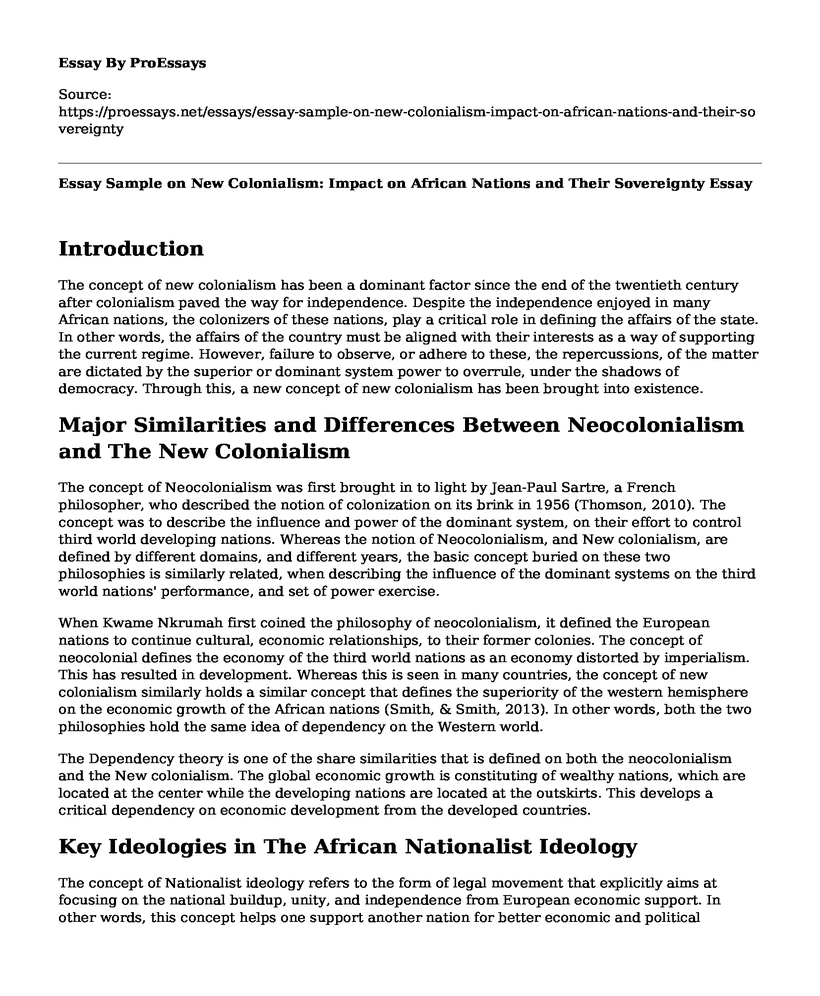Introduction
The concept of new colonialism has been a dominant factor since the end of the twentieth century after colonialism paved the way for independence. Despite the independence enjoyed in many African nations, the colonizers of these nations, play a critical role in defining the affairs of the state. In other words, the affairs of the country must be aligned with their interests as a way of supporting the current regime. However, failure to observe, or adhere to these, the repercussions, of the matter are dictated by the superior or dominant system power to overrule, under the shadows of democracy. Through this, a new concept of new colonialism has been brought into existence.
Major Similarities and Differences Between Neocolonialism and The New Colonialism
The concept of Neocolonialism was first brought in to light by Jean-Paul Sartre, a French philosopher, who described the notion of colonization on its brink in 1956 (Thomson, 2010). The concept was to describe the influence and power of the dominant system, on their effort to control third world developing nations. Whereas the notion of Neocolonialism, and New colonialism, are defined by different domains, and different years, the basic concept buried on these two philosophies is similarly related, when describing the influence of the dominant systems on the third world nations' performance, and set of power exercise.
When Kwame Nkrumah first coined the philosophy of neocolonialism, it defined the European nations to continue cultural, economic relationships, to their former colonies. The concept of neocolonial defines the economy of the third world nations as an economy distorted by imperialism. This has resulted in development. Whereas this is seen in many countries, the concept of new colonialism similarly holds a similar concept that defines the superiority of the western hemisphere on the economic growth of the African nations (Smith, & Smith, 2013). In other words, both the two philosophies hold the same idea of dependency on the Western world.
The Dependency theory is one of the share similarities that is defined on both the neocolonialism and the New colonialism. The global economic growth is constituting of wealthy nations, which are located at the center while the developing nations are located at the outskirts. This develops a critical dependency on economic development from the developed countries.
Key Ideologies in The African Nationalist Ideology
The concept of Nationalist ideology refers to the form of legal movement that explicitly aims at focusing on the national buildup, unity, and independence from European economic support. In other words, this concept helps one support another nation for better economic and political sustainability. The notion of African nationalism is regarded as a political affair that defines the movement which focuses on the unification of African nations (Snyder, 2017). The concept of African Nationalist ideology helps to identify Africans not only through their origin, society, culture, political affairs, but it helps unite the entire country, with primary identity, and support from other nations.
What Distinguishes This Ideology from Negritude, Afrocentricity, And Pan-Africanism
The primary focus of Africa nationalism stresses on the need for a separate and independent African community that is independent of the European community. This promotes racial pride. On the other hand, Afrocentricity supports the political movement, centered around African Americans, who hold the custom of holding African cultures, and values. Whereas this focuses on growing the African culture beyond African borders, the African Nationalism focuses on uniting, promoting, and encouraging unity, among Africans to ensure that independence of economy, and the political view is attained.
References
Smith, A., & Smith, A. D. (2013). Nationalism and modernism. Routledge. https://doi.org/10.4324/9780203167960
Snyder, L. (2017). The new nationalism. Routledge. https://doi.org/10.4324/9781315133430
Thomson, A. (2010). An introduction to African politics. Routledge. https://doi.org/10.4324/9780203857946
Cite this page
Essay Sample on New Colonialism: Impact on African Nations and Their Sovereignty. (2023, Jan 30). Retrieved from https://proessays.net/essays/essay-sample-on-new-colonialism-impact-on-african-nations-and-their-sovereignty
If you are the original author of this essay and no longer wish to have it published on the ProEssays website, please click below to request its removal:
- Social Media and Government Regulations Essay Example
- Article Analysis Essay on Trump on Closing the Border
- Control in Combating Financial Corruption in Government Agencies: A Saudi Arabian Case Study
- Paper Example on Polk County, FL: Decentralized Governance & Self-Governance Through its Charter
- Essay Example on Sovereignty: Disputed Meaning and Evolving Definitions
- Thomas Graham: Pioneering Chemistry through Graham's Law of Diffusion and Scientific Contributions - Free Paper
- Government Spending and Taxation - Report Example







